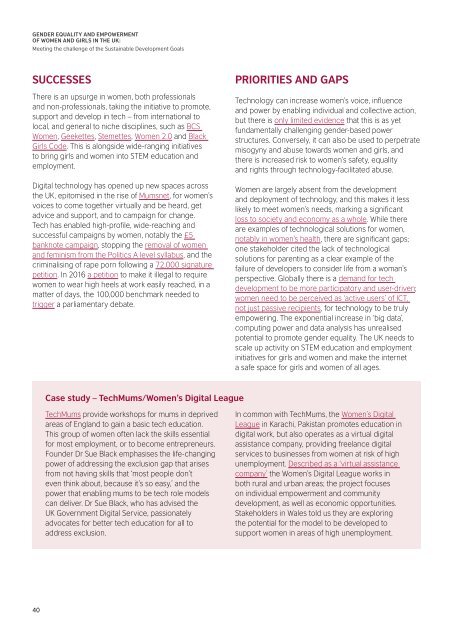GENDER EQUALITY AND EMPOWERMENT OF WOMEN AND GIRLS IN THE UK
gender_equality_an_empowerment_in_the_uk
gender_equality_an_empowerment_in_the_uk
Create successful ePaper yourself
Turn your PDF publications into a flip-book with our unique Google optimized e-Paper software.
<strong>GENDER</strong> <strong>EQUALITY</strong> <strong>AND</strong> <strong>EMPOWERMENT</strong><br />
<strong>OF</strong> <strong>WOMEN</strong> <strong>AND</strong> <strong>GIRLS</strong> <strong>IN</strong> <strong>THE</strong> <strong>UK</strong>:<br />
Meeting the challenge of the Sustainable Development Goals<br />
SUCCESSES<br />
There is an upsurge in women, both professionals<br />
and non-professionals, taking the initiative to promote,<br />
support and develop in tech – from international to<br />
local, and general to niche disciplines, such as BCS<br />
Women, Geekettes, Stemettes, Women 2.0 and Black<br />
Girls Code. This is alongside wide-ranging initiatives<br />
to bring girls and women into STEM education and<br />
employment.<br />
Digital technology has opened up new spaces across<br />
the <strong>UK</strong>, epitomised in the rise of Mumsnet, for women’s<br />
voices to come together virtually and be heard, get<br />
advice and support, and to campaign for change.<br />
Tech has enabled high-profile, wide-reaching and<br />
successful campaigns by women, notably the £5<br />
banknote campaign, stopping the removal of women<br />
and feminism from the Politics A level syllabus, and the<br />
criminalising of rape porn following a 72,000 signature<br />
petition. In 2016 a petition to make it illegal to require<br />
women to wear high heels at work easily reached, in a<br />
matter of days, the 100,000 benchmark needed to<br />
trigger a parliamentary debate.<br />
PRIORITIES <strong>AND</strong> GAPS<br />
Technology can increase women’s voice, influence<br />
and power by enabling individual and collective action,<br />
but there is only limited evidence that this is as yet<br />
fundamentally challenging gender-based power<br />
structures. Conversely, it can also be used to perpetrate<br />
misogyny and abuse towards women and girls, and<br />
there is increased risk to women’s safety, equality<br />
and rights through technology-facilitated abuse.<br />
Women are largely absent from the development<br />
and deployment of technology, and this makes it less<br />
likely to meet women’s needs, marking a significant<br />
loss to society and economy as a whole. While there<br />
are examples of technological solutions for women,<br />
notably in women’s health, there are significant gaps;<br />
one stakeholder cited the lack of technological<br />
solutions for parenting as a clear example of the<br />
failure of developers to consider life from a woman’s<br />
perspective. Globally there is a demand for tech<br />
development to be more participatory and user-driven;<br />
women need to be perceived as ‘active users’ of ICT,<br />
not just passive recipients, for technology to be truly<br />
empowering. The exponential increase in ‘big data’,<br />
computing power and data analysis has unrealised<br />
potential to promote gender equality. The <strong>UK</strong> needs to<br />
scale up activity on STEM education and employment<br />
initiatives for girls and women and make the internet<br />
a safe space for girls and women of all ages.<br />
Case study – TechMums/Women’s Digital League<br />
TechMums provide workshops for mums in deprived<br />
areas of England to gain a basic tech education.<br />
This group of women often lack the skills essential<br />
for most employment, or to become entrepreneurs.<br />
Founder Dr Sue Black emphasises the life-changing<br />
power of addressing the exclusion gap that arises<br />
from not having skills that ‘most people don’t<br />
even think about, because it’s so easy,’ and the<br />
power that enabling mums to be tech role models<br />
can deliver. Dr Sue Black, who has advised the<br />
<strong>UK</strong> Government Digital Service, passionately<br />
advocates for better tech education for all to<br />
address exclusion.<br />
In common with TechMums, the Women’s Digital<br />
League in Karachi, Pakistan promotes education in<br />
digital work, but also operates as a virtual digital<br />
assistance company, providing freelance digital<br />
services to businesses from women at risk of high<br />
unemployment. Described as a ‘virtual assistance<br />
company’ the Women’s Digital League works in<br />
both rural and urban areas; the project focuses<br />
on individual empowerment and community<br />
development, as well as economic opportunities.<br />
Stakeholders in Wales told us they are exploring<br />
the potential for the model to be developed to<br />
support women in areas of high unemployment.<br />
40


